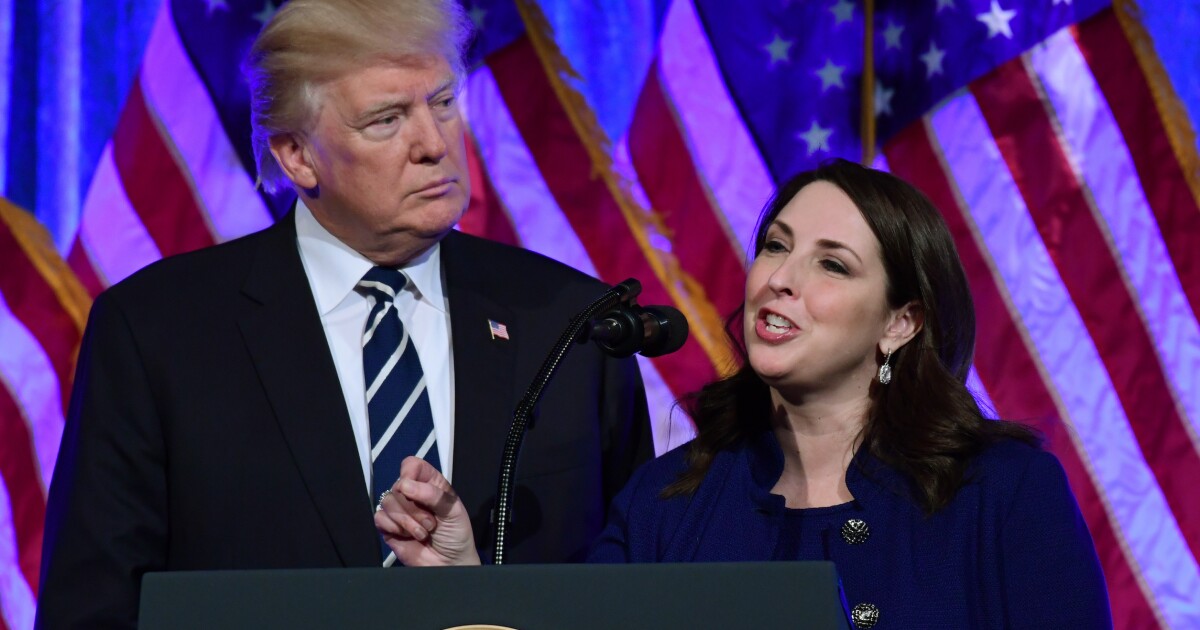

The race for the Republican National Committee chairmanship offered a fascinating glimpse into the state of the party between last year’s midterm elections and the 2024 presidential contest.
Republicans have not made any major leadership changes following a disappointing midterm cycle in which they failed to capitalize on a highly favorable political environment, are unsure how to deal with former President Donald Trump, still struggle to focus on making their case against President Joe Biden while re-litigating the 2020 election results, and have little faith in their party’s establishment wing but have been unable to build a credible alternative to it.
Ronna McDaniel trounced conservative attorney Harmeet Dhillon 111 to 51 on her way to a fourth term at the helm of the RNC. MyPillow CEO Mike Lindell received four votes.
ABORTION EMERGES AS AN UNLIKELY STUMBLING BLOCK IN TRUMP’S POLITICAL COMEBACK BID
Despite minimal support among RNC members, both camps to varying degrees feted Lindell, known mainly for his pillows and purloined election claims. McDaniel pledged after winning to work “alongside Harmeet and Mike, to heal as a Party and elect Republicans,” while a top Dhillon representative declared of her candidate and Lindell, “Those two people, together, they can land this plane right now for our country.”
McDaniel’s reelection comes just after two dozen conservatives forced the House speaker vote to go 15 ballots and extracted concessions from eventual Speaker Kevin McCarthy (R-CA). But they didn’t have a viable challenger to McCarthy who could win a majority either on the House floor or in the Republican conference. Another higher-stakes version of this fight will play out in the coming weeks over raising the debt ceiling.
Grassroots conservatives have little faith in the GOP’s governing class to fulfill campaign promises and realize their policy objectives even after winning elections. But one of the reasons the House Republican majority is small and Democrats still control the Senate is that too few of the candidates who prevailed in the primaries thanks to conservative activists — and, especially, Trump — won their elections.
In Congress and at the RNC, the leadership that presided over the midterm flop has mostly been returned to power. That is partly because the alternatives to these leaders were often associated with the failed campaigns of last year.
Case in point: The challenge Senate Minority Leader Mitch McConnell (R-KY) faced was Sen. Rick Scott (R-FL), who chaired the Senate GOP’s campaign arm as the party actually lost a seat in the upper chamber.
Democrats managed to mostly hang on in spite of exit polls showing 79% saying inflation caused moderate to severe hardship for their family, 76% rating the economy as not good or poor, 67% not wanting Biden to run for reelection, and 65% saying his policies were either hurting the country or making no difference. On Election Day last year, 55% disapproved of Biden’s performance in office.
The conditions were there for Republicans to do better than they did. In a number of states, exit poll respondents who only somewhat disapproved of Biden turned out to be a key swing vote. In too many Senate races, they swung against the Republican candidate.
Republicans are still faced with the prospect of nominating Trump, whose favorability rating was slightly below Biden’s in the exit polls, again in 2024. That would keep the party leadership ranks intact. Or they could nominate someone else, such as Gov. Ron DeSantis (R-FL). Most candidates aside from Trump and DeSantis are trailing well behind in the early polls.
The GOP also has an opportunity to recapture the Senate after missing out in 2022, with an even more favorable map that would not require a red wave to make serious inroads. “It isn’t necessarily a stretch to say that Democrats are defending the top 8 Senate seats likeliest to flip,” states the first 2024 projection by Larry Sabato’s Crystal Ball. But Republicans would still need to nominate candidates who could take advantage.
No faction of the Republican Party is happy. None have yet demonstrated the ability to effect changes that might improve the GOP’s fortunes. The pre-Trump GOP isn’t coming back, and the post-Trump GOP’s arrival is far from assured.
CLICK HERE TO READ MORE FROM THE WASHINGTON EXAMINER
The next two years could change a lot for the GOP. Right now, it is a party stuck in limbo.






